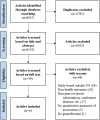Impacts of Gentrification on Health in the US: a Systematic Review of the Literature
- PMID: 32829469
- PMCID: PMC7704880
- DOI: 10.1007/s11524-020-00448-4
Impacts of Gentrification on Health in the US: a Systematic Review of the Literature
Abstract
Gentrification in the largest 50 US cities has more than doubled since the 1990s. The process of gentrification can bring about improved neighborhood conditions, reduced rates of crime, and property value increases. At the same time, it can equally foster negative conditions associated with poorer health outcomes, such as disrupted social networks from residential displacement and increases in stress. While neighborhood environment is consistently implicated in health outcomes research, gentrification is rarely conceptualized as a public health issue. Though research on gentrification is growing, empirical studies evaluating the health impacts of gentrification in the US are poorly understood. Here we systematically review US population-based empirical studies examining relationships between gentrification and health. Electronic databases (PubMed, Embase, CINAHL, PsycINFO, Scopus, Web of Science, and Academic Search Complete) were searched using a combination of terms to identify peer-reviewed studies published on or before July 9, 2018, reporting associations between gentrification and health. Study title and abstract screenings were followed by full-text review of all studies meeting the following inclusion criteria of: ≥ 1 quantitative measure of association for a health outcome, within the context of gentrification; peer-reviewed research; located in the US; and English language. Of 8937 studies identified, 6152 underwent title and abstract screening, and 50 studies underwent full-text screening, yielding six studies for review. Gentrification exposure measures and health outcomes examined varied widely. Most studies reported little to no overall association between gentrification and health outcomes; however, gentrification was repeatedly associated with undesirable health effects among Black and economically vulnerable residents. Despite seemingly overall null associations between gentrification and health, evidence suggests that gentrification may negatively impact the health of certain populations, particularly Black and low-income individuals. Complexities inherent in operationalizing gentrification point toward the need for validated measures. Additionally, understanding how gentrification-health associations differ across health endpoints, race/ethnicities, socioeconomic status, and life course can provide insight into whether this process contributes to urban inequality and health disparities. As gentrification occurs across the US, it is important to understand how this process impacts health. While aging cities reinvest in the revitalization of communities, empirical research examining relationships between gentrification and health can help inform policy decisions.
Keywords: Gentrification; Health; Systematic review.
Figures
References
-
- Hwang J, Lin J. What have we learned about the causes of recent gentrification? Cityscape. 2016;18(3):9–26.
-
- Williams DR. Race, socioeconomic status, and health. The added effects of racism and discrimination. Ann N Y Acad Sci. 1999;896:173–188. - PubMed
-
- Bates LK. Gentrification and displacement study: implementing an equitable inclusive development strategy in the context of gentrification. Urban Studies and Planning Faculty Publications and Presentations. Portland State University PDXScholar; Portland, Oregon; 2013;83.
-
- Cassel J. The contribution of the social environment to host resistance. The fourth Wade Hampton frost lecture. 1976. Am J Epidemiol. 1995;141(9):798–814. - PubMed
Publication types
MeSH terms
Grants and funding
LinkOut - more resources
Full Text Sources
Research Materials


